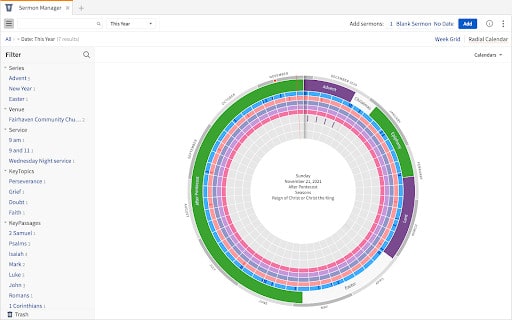Peter J. Leithart opens Reflecting on the Word: Video Devotionals (Year C) by exploring the Church calendar and why it’s valuable for believers.
Video excerpt and transcript below.
Human beings are temporal creatures, but this doesn’t simply mean that we live according to clock time, the ticktock of passing seconds and minutes. Time has different qualities; time is experienced differently. We can spend an hour waiting for a late bus, or we can spend an hour absorbed in a lively conversation or absorbed in a good book or a great movie. By the clock, it’s the same duration, but the experience of time is very different. Our time is always articulated in various ways; it’s never simply the experience of the ticktock of passing seconds and minutes.
Human beings are also temporal creatures in the sense that we organize our time. We organize our days by schedules, according to different activities that we need to accomplish. We organize our weeks in a rhythm of work and leisure. We organize our years by holidays and anniversaries, by birthdays and vacations. And we do this collectively. We do this as groups. Every society has a national calendar. In the United States, we have national holidays like the Fourth of July and Thanksgiving. Everyone in the United States celebrates Christmas; even those who are not Christians are celebrating the birth of Jesus. Other countries have other holidays and organize their year differently.
These holidays are not simply celebrations, but they are moments for collective memory, for remembering past events of our society, for memorializing and celebrating our heroes, for remembering what it is that makes us the people that we are. When Americans celebrate the Fourth of July, we remember the signing of the Declaration of Independence and the founding fathers, but we also remember the principles on which they founded this nation, and we recommit ourselves to the liberty and the freedom that they established for us. These celebrations are acts of collective memorialization that make us the people that we are.
All this is to say that human beings inevitably organize their year in some pattern or other. The choice is never between having an annual pattern or not. The choice is always which pattern we will use.
Organizing time Christianly
Many modern Christians adopt the calendar of the surrounding culture rather than following a distinctively Christian calendar. In some American churches, for example, the Fourth of July is a bigger celebration even than the celebration of Jesus’ resurrection at Easter. This should give us pause. This should make us wonder: is this an accommodation to the world? Are Christians patterning our time according to the time of America, or according to Christian reckoning of time? Should a Christian arrangement of time somehow be stamped with the memory of Jesus Christ rather than simply with the memory of Thanksgiving or the Fourth of July or other national events?
The Church has long answered “yes” to the question of whether time should be organized Christianly. After all, Israel, before the church, had its own liturgical calendar. A significant portion of every year in ancient Israel was organized by celebration of different events of Israel’s history. Israel, every year, celebrated the Passover; every year they remembered their time in the wilderness. Later on they introduced the Feast of Purim, which celebrated the deliverance of Israel from Haman, and later still they introduced the Feast of Hanukkah, the Feast of Lights, which commemorated the dedication of the Second Temple.
The Church calendar
Building on this Jewish pattern, the early Church developed a liturgical calendar that was organized around the events of the life of Jesus.
Advent
The traditional Church calendar begins in late fall or early winter with the season of Advent. Advent means “coming,” and it commemorates and remembers the coming of Jesus, the coming of the Son of God as our redeemer. But Advent isn’t simply a look back to that past coming of Jesus. It also reminds us of the various ways in which God comes to us again and again through the course of history, and it points us ahead to the final coming of Jesus at the end of all things, when he will come to judge the quick and the dead, the living and the dead.
Christmas and Epiphany
Christmas, of course, celebrates the birth of Jesus, but the Church has never been content simply to celebrate a single day to celebrate the birth of Jesus. Christmas has been a season of celebration, and it was followed by the season of Epiphany. Epiphany means “manifestation” or “appearance,” and Epiphany celebrates and commemorates the various appearances of Jesus and the glory of Jesus during his life. It commemorates those moments when Jesus’ sonship to the Father became especially evident and especially manifest: at his baptism, on the Mount of Transfiguration, and so on.
Lent and Holy Week
With Lent, the church has entered into the sufferings of Jesus. For 40 days, many Christians throughout the centuries have entered into a fast and spent their time meditating on the cost of our salvation, on the sufferings of Jesus Christ for our redemption. Holy Week is the climax of the life of Jesus. It commemorates and remembers the death, burial, and sufferings of Jesus—the crucifixion. But then Holy Week concludes with a great burst of light, the celebration of Jesus’ triumph over death, at Easter.
Ascension Day and Pentecost
But Jesus did not end his life and his work with Easter and with the resurrection. Forty days after Easter, Jesus ascended to the right hand of his Father, and the church has commemorated and celebrated that enthronement to the right hand of the Father in Ascension Day. Ten days after Jesus ascended, he sent the Holy Spirit upon his apostles, so the apostles could speak in tongues and the apostles could carry on Jesus’ mission to the world, and the Church has celebrated this day of Pentecost, this day of the coming of the Spirit.
Reflecting on the triune God
The season after Pentecost lasts from spring until the beginning of Advent, and it has been, historically, a time when the Church has reflected on the God who is revealed in the life, death, resurrection, and enthronement of Jesus Christ.
The entire Church calendar from Advent to Pentecost is an unveiling of the triune God. The Father sends the Son, who comes at Advent and who is born at Christmas, the Son who suffers during Lent and suffers death on the cross and is raised triumphantly at Easter. And then the Father and the Son send the Spirit at Pentecost. From Advent through Pentecost is an unveiling of the triune God, and the remainder of the Church calendar, the remainder of the Church year after Pentecost, is a time for reflection on that God, the God of the gospel.
The value of the Church calendar
The Church calendar has enormous pastoral value. The Church calendar inoculates us from the culture around us. It inoculates us against reckoning our time and organizing our time by worldly standards and worldly patterns. Our time is reckoned Christianly. The Church calendar keeps our focus where it should be, on Jesus Christ. A church that follows the Church calendar and a lectionary is going through the life, death, resurrection, and ascension of Jesus and the gift of the Spirit every year. Year after year the congregants will hear the same stories about Jesus.
I am blessed to have grown up in a Lutheran church that celebrated the church year and had a lectionary. Each year I heard the same readings from the Gospel of John about the sufferings and the death of Jesus, about his resurrection. I heard the same readings about the gift of the Spirit at Pentecost. And these texts became part of my life. Even if I never sat down to memorize them, I have many texts of Scripture virtually memorized from hearing them again and again through the lectionary.
This is one of the ways the gospel imprints itself on time. This is one of the ways the God of the gospel redeems time and brings it into his own life and stamps it with his own character.1
***
The Mobile Ed course Reflecting on the Word: Video Devotionals (Year C) includes 43 video devotionals from top biblical and theological scholars keyed to seasons of the yearly Church calendar—a unique option for prioritizing your devotional time with God for the new year.
***
Preaching and teaching year-round takes organization and a ton of time—but too often, sermon planning doesn’t get the forethought it needs. The Logos Sermon Manager makes organizing your preaching calendar for the coming year easy. It’s a full-featured planning and archiving tool to help you plan future sermon series or view previous ones—but one of the handiest features within Sermon Manager is the radial liturgical calendar. With it you can overlay your sermons and even your church’s calendar according to season and important church dates, making sermon planning (and storing) easy:
- Brannan, Rick, Ken Deeks, Darrell L. Bock, Craig S. Keener, Fred Sanders, Brannon Ellis, Dale A. Brueggemann, et al., Reflecting on the Word: Video Devotionals (Year C) (Lexham Press, Bellingham, WA), 2018.







